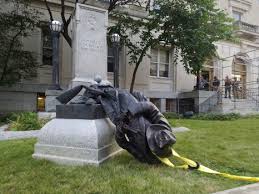
When I was a kid we used to play a game called “Spin the Statue.” Whoever was It would take each participant by both hands, spin her around and let her go, at which time she was supposed to freeze in position. Once everyone was frozen, It would survey the group and assign each person a part in a scene or tableau (“You be the car, you’re the driver, you’re the road, and . . . uh . . . you be the stop sign”). Then turn around and count slowly to 10 while everyone assembled themselves, and when It turned back the scene should be in place. (Though not for long, especially for the person who ended up being the road.)
When I first started on this series, the whole world was in the middle of an economic freeze, with no one as It to tell us how we were supposed to reassemble ourselves. Most of us agreed some changes would be permanent—big cities would begin to hollow out, more workers would be working at home, and possibly (on the downside) economic depression and suicide would deepend. Some predicted explosions of excess when the lockdowns were lifted. I don’t recall anyone predicting literal explosions, but here we are.
Given the pressures of being cooped up for almost three months, any strong emotional trigger could set off a whole nation. One reason George Floyd’s death became the trigger is that it was so iconic. A black man crushed into the gravel with a white man’s knee on his neck—what better picture of the whole tragic history of race? The tinder was already there: the well-publicized 1619 Project, a dozen best-sellers from the recent past all on the same theme, widespread discontent at a supposed racist in the White House. All it needed was a spark.
When the center does not hold, things fall apart. The political center, guided by what we might loosely label “western values,” has been crumbling for decades. It’s impossible at this point to tell how many Americans even understand their country, or think it’s worth defending. There will be no savior from D.C., now or perhaps ever. Our culture, post-Christian, is quickly becoming post-American.
The one time in history God claimed a nation as his own, it wasn’t for national pride. “It was because the LORD loved you and kept the oath he swore to your fathers that he brought you out with a mighty hand and redeemed you from the land of slavery” (Deut. 7:8). The story of Israel’s roots, told in Genesis 12-50, is not the typical heroic narrative. Our own history is a complex narrative of lofty ideals and shameful deeds, heroic self-sacrifice and hypocritical greed. The potential for nobility creates a corresponding potential for venality. Freedom to achieve means freedom to deceive, and the United States is the story of both.
But it’s also the story of self-correcting over time: how the lofty ideals reassert themselves and remind us how far we’ve wandered. The preamble to the Declaration of Independence is our national conscience, particularly, “We hold these truths to be self-evident, that all men are created equal, that they are endowed by their Creator with certain inalienable rights . . .” It’s human nature to default to but some are more equal than others (see Jefferson the slave-owner), but the principle is sound and biblical, and sound because it’s biblical.
In the current wild spin, what shape have be spun ourselves into? Could be a spasm, or signal for real and lasting decline. The United States as originally conceived is definitely worth striving for, yet we know for a fact that no nation lasts forever. Sooner or later—and we can definitely pray for later—the United States will disunite.
But we are dual citizens, and What Remains is the Word of God. Truth is stumbling in the streets (Is. 59:14) but it won’t disappear. If we (as a nation) will not have truth for our conscience, we will have it as our consequence, played out in literal and figurative street fights. But we (as a royal priesthood) will always have a place to call home.

Sound assessment…
To comment on one facet of current American unrest, I’m cynical about calls for the removal of certain statues because I feel that some of the alleged suffering of those who feel traumatized when they pass them is self inflicted. Nobody has to think about history. People choose to do so. (For the record,that doesn’t mean I’m cynical about anyone who’s worried about America being racist.)
But I’m cynical about some of the people defending these statues too. I doubt that many of them actually thought or cared much about, say, Andrew Jackson before this. They just hate to give their cultural opponents anything they want.
I agree there’s a lot of cynicism around. Also simple power-grabbing. For myself, I haven’t really worked out what I think about statues and what they represent and which should be pulled down. Whatever pulling-down is done, however, shouldn’t be done by a mob.